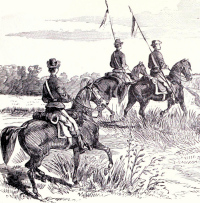THE REMOVAL.
Springfield, November 2d. The catastrophe has come which we have long dreaded, but for which we were in no degree prepared. This morning, at about ten o’clock, while I was standing in front of my tent, chatting with some friends, an officer in the uniform of a captain of the general staff rode up, and asked the orderly to show him to the General. He went into the house, and in a few moments came out and rode off. I soon learned that he had brought an order from General Scott informing General Fremont that he was temporarily relieved of his command, and directing him to transfer it to Major-General Hunter and report himself to the head-quarters of the army by letter. The order was originally dated October 7th, but the date had been altered to October 24th, on which day it left St. Louis, –the day the Guards started upon their expedition to Springfield.
This order, which, on the very eve of consummation, has defeated the carefully matured plans upon which the General’s fortunes and in so large a measure the fortunes of the country depended, –which has destroyed the results of three months of patient labor, transferring to another the splendid army he has called together, organized, and equipped, and giving to another the laurel wreath of victory which now hangs ready to fall at the touch, –this order, which has disappointed so many long-cherished hopes, was received by our magnanimous General without a word of complaint. In his noble mind there was no doubt or hesitation. He obeyed it promptly and implicitly. He at once directed Colonel Eaton to issue the proper order transferring the command to General Hunter, and having prepared a brief address to the soldiers, full of pathos and patriotic devotion, he rode out accompanied by the Delawares to examine the positions south of the village.
Hunter has not yet been heard from: three couriers have been sent after him. General Pope is now in command here. It is understood, that, until the Commanding General arrives, the army will stand upon the defensive, and that no engagement will take place, unless it is attacked. General Fremont and his staff will leave to-morrow for St. Louis.
This evening I rode through Sigel’s and McKinstry’s camps. The general order and the farewell address had been read to the regiments, and the camp-fires were surrounded by groups of excited soldiers, and cheers for Fremont were heard on every side.
Fremont’s Hundred Days in Missouri was published in three installments in The Atlantic Monthly. The anonymous author appears to have been a member of Fremont’s staff with a disdainful bias towards Missourians, even those who were pro-Union.
